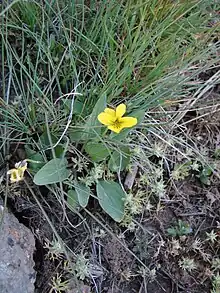Viola nuttallii
Viola nuttallii (Nuttall's violet or yellow prairie violet[1]) is a perennial herbaceous plant in the violet family (Violaceae), and is one of the few violet species with lanceolate leaves. It is native to the western Canada and the north-central and western United States,[2] appearing in upper steppe lands, forests, and alpine ridges.[3]
| Viola nuttallii | |
|---|---|
 | |
| Scientific classification | |
| Kingdom: | Plantae |
| Clade: | Tracheophytes |
| Clade: | Angiosperms |
| Clade: | Eudicots |
| Clade: | Rosids |
| Order: | Malpighiales |
| Family: | Violaceae |
| Genus: | Viola |
| Species: | V. nuttallii |
| Binomial name | |
| Viola nuttallii | |
The genus name Viola means violet in Latin. For Nuttall's violet the only purple coloring is the nectar guides in the throat of the flower.[4] The species name is given in honor of noted botanist Thomas Nuttall.[2]
The plant is highly variable, usually with bright yellow petals. The veined, elliptical leaves are 2.5–10 centimeters (1–4 in) long.[3]
The species serves as a larval host for the Coronis fritillary butterfly.[2]
The leaves and flowers of the plant are edible as well as high in vitamins A and C. However, the rhizomes, fruits, and seeds are high in saponins and should not be eaten. [5]
References
- "Viola nuttallii". Germplasm Resources Information Network. Agricultural Research Service, United States Department of Agriculture. Retrieved 2010-03-11.
- "Viola nuttallii". Native Plant Database. Lady Bird Johnson Wildflower Center, University of Texas at Austin. Retrieved 2010-03-11.
- Taylor, Ronald J. (1994) [1992]. Sagebrush Country: A Wildflower Sanctuary (rev. ed.). Missoula, MT: Mountain Press Pub. Co. p. 168. ISBN 0-87842-280-3. OCLC 25708726.
- "Nuttall's Violet". Plant of the Week. US Forest Service. Retrieved 2012-05-08.
- "Nuttall's Violet". www.fs.usda.gov. Retrieved 2023-06-25.